So I just managed to make $100k on predicting the new pope today.
If you're interested in reading how, I'll fully go through it. If you aren't, then see ya! But please say a quick prayer that I don't get excommunicated, thx.
Alright, so normally I don't like to talk about bets, because they're repeatable events and small edges are important. But considering the next conclave is probably 15 years away, I think I'm safe to talk shop.
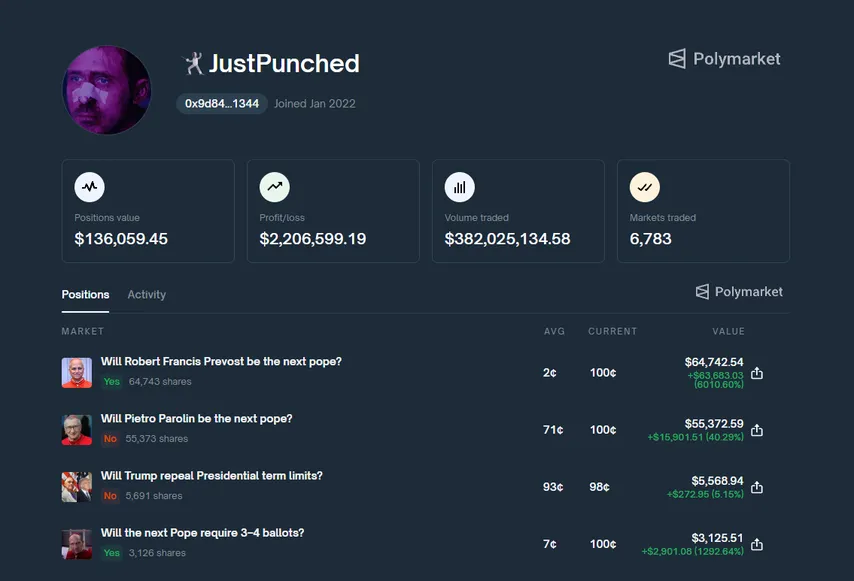
Pricing
The first thing to know is that the next pope "pricing" is about 70% nonsense with only a loose correlation to reality. This is an extremely hard event to price. Not even the participants themselves would probably know how to handicap it.
And so when you have an event where the pricing is 70% nonsense, it's like walking into a store that doesn't communicate with the outside world. Where the employees are just going through and assigning prices based on vibes and what they think of the aesthetics. Oh that cereal has a Leprechaun on the box and colored marshmallows? OK so that's like $15 for that one. And that cereal is just circular wheat with something about lowering cholesterol? Yikes...okay, $2 for that.
The market that was 70% nonsense featured two heavy favorites -- Parolin who traded around 30 and "Asian Francis" Tagle who traded around 22. Right off the bat, you start with two men that are (combined) likelier than not to be pope despite the history of these conclaves being a little chaotic and very unpredictable (not quite as chaotic as the movie Conclave, but it gets the gist right). If you knew nothing else about the event other than the prices probably suck, you could safely buy no on those two for 48c and win 52c a good percentage of the time. So I shorted those guys, first a little and then a lot (I'll get to the "a lot" part later).
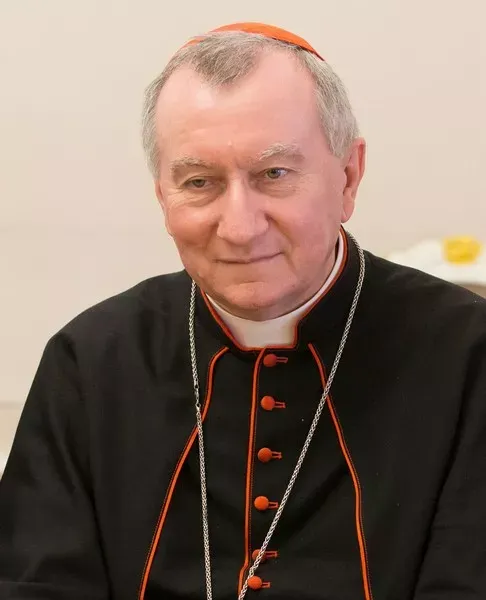
But if you have two people that are too high, and the market adds up to 100, that means a lot of realistic people are way, way too low. And that's where the work and the research comes into play. And I did a lot of work, and a lot of research. And my positional bet was to short the major frontrunners (and also some of the guys trading at 6c+), and to proactively bet on some 1c-3c guys that were way too low. Prevost was one of the people I circled as way too low. He was that low principally because he is/was an American! It was a widely held belief that it would be very, very hard to elect an American pontiff (which doesn't make sense to me, and probably didn't cross the Cardinals minds much).
To be clear, though: I got a bit lucky in this instance. It WAS one of the 1-3c guys that I circled. But it easily could've been the case that I would have a much smaller win if a second tier frontrunner won, or even a big loss if one of the two big favorites was named Pope.
I put myself in an advantageous position that if I did get lucky, that it would be a huge payday. Do the research and make good bets. The actual outcome, however, is often in the hands of fate (or, in this case, the Holy Spirit).
Setting
Now let's get into the setting of the conclave. This event takes place in Italy. That is important for a few reasons.
Let's start off with painting a picture. Italy is not like other countries. I think someone accustomed to reading press coverage in the style of American or UK journalism would be a little taken aback when reading a similar story in an Italian paper. There's much less emphasis on straight forward facts, and a lot more emphasis on drama. The prose is flowery, bordering on romantic. Mundane things are described with vivid imagery. The authors sound like they're about to ask you out for a drink at literally any moment.
And so in this environment of dramatic Italian politics, being the frontrunner can be very, very, very bad. You are the focus of attention, of whispers, and of what little campaigning there is. Under a microscope, the warts are always going to stand out. There is a loose concept in Italy of "bruciare un nome" or "burning a name." If you are in focus, your name can get burned by people who are against you and/or the relentless rumor mill.
There was a dramatic Italian election a few years ago where no party had enough seats to form a government, and a far-right party (Lega) and a vaguely populist party (M5S) decided to try to team up and form a government, with mixed results. They took forever to form an agreement, and then took forever to find a Prime Minister. Each time a name entered the press of a possible PM, it would be quickly "burned" by opponents for one reason or another, and that person was then unelectable. This went on for days. And finally, through some miraculous act of self-control, they kept their official pick completely secret and revealed him at the very last second: a totally random law professor that few had heard of, Giuseppe Conte. This might've been the biggest spike in Google searches in Italian history.
It was shocking and weird and funny, and there was barely any time for anyone to find anything negative about the guy because nobody had any clue who he was. His Wikipedia page was created ~6 hours before he was named! He went from little-known law professor to leader of a country before anyone could catch their breath, let alone burn the name. (Conte would also be the subject of one of the funniest 1c-->100c flips of all time, but that is a story for another day).
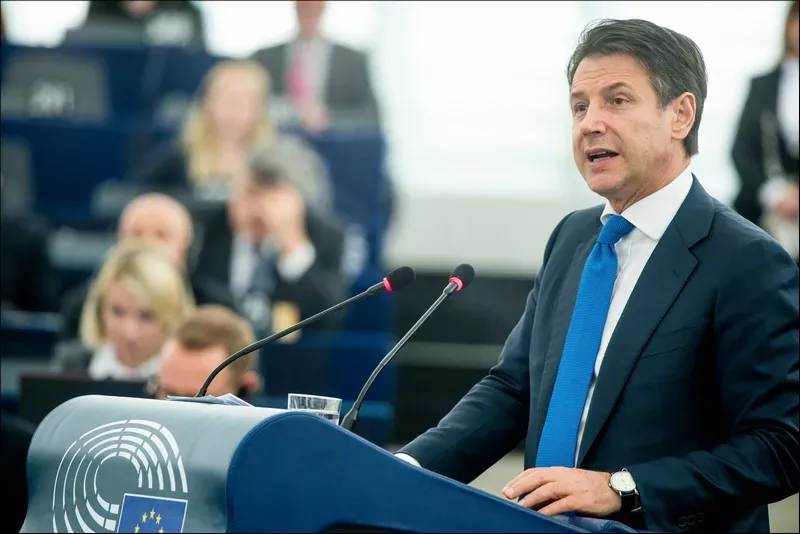
All of that is to say that being a frontrunner is a double edged sword. You may get more initial votes in this context with a higher profile, but you may also get your reputation burned and prevent the very thing you need: a 2/3rd majority.
And finally, the last thing to say about the Italians is that there is a strong home-team bias, and the Italians love positioning Italians as the frontrunner. Or as gaining ground. After all, the Papacy was in the hands of Italians continuously for 450 years before John Paul II's win (neither of the two Italian frontrunners that year could reach 2/3rd).
Of the 4 highest priced possible Popes as of this morning, 3 of them = Italian. Zuppi, Pizzaballa, and Parolin. This was not coincidental! Nor did it even make sense: this was the most diverse set of Cardinals ever in the conclave, by far. The idea that they would gravitate back to Italians is possible, but seems like a bad assumption.
Final Considerations
After thinking about it a lot, and reading the coverage, and factoring in all of the above, I simply decided that the pricing for Parolin and Tagle were way too high, and high for not very good reasons.
It was very unclear if Parolin was actually a frontrunner or merely some kind of default (he was Francis' #2). He is not very charismatic, and it would be a slightly odd choice to go from a pontiff who is very pastoral-minded to one that is very much administrative. I reason it would likely be some kind of mixture (and arguably this thesis bore itself out in the end).
Tagle had the moniker of "Asian Francis" and I watched videos of him and was really inspired. Very cool guy. But it is rare in transitions for like to replace like, and in any event, Tagle had some other managerial issues and reasons to be skeptical that he was a frontrunner (let alone could reach 2/3rds). To me, his price was propped up by the moniker.
So as a directional bet, I decided to just bet a ton that the next Pope would be someone other than these two.
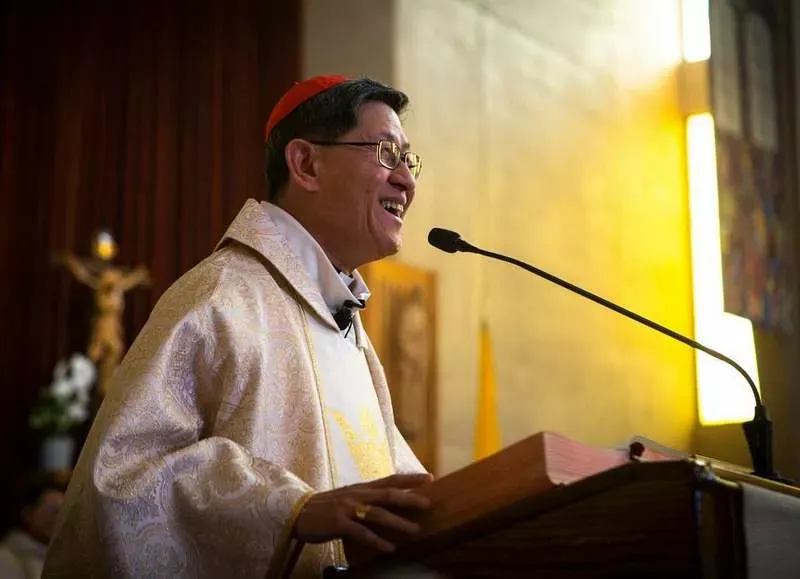
Live Trading
The white smoke went up after the fourth ballot. This is, relatively speaking, fast. And the logical conclusion (and one that I immediately jumped to) is that this means a strong vote getter from the 1st round has consolidated the vote and become Pope.
Parolin went to ~65%. Tagle stayed around ~20%. These two were 85% to be Pope, and tbh even though that price was incredibly wrong in hindsight, it's hard to think it's THAT wrong in the moment. I was convinced I had lost a lot of money! I decided not to chase good money after bad, and not to bet more against Tagle/Parolin. I would accept my loss like a good little boy.
But what I DID do is scroll through the list of other options. When you have two people now trading at 85%+, everyone else is in the clearance aisle. And I went rummaging in the bargain bin, and found Turkson at 100-1 and Prevost at 200-1. In hindsight, I should've also bought Grech at whatever he was at.
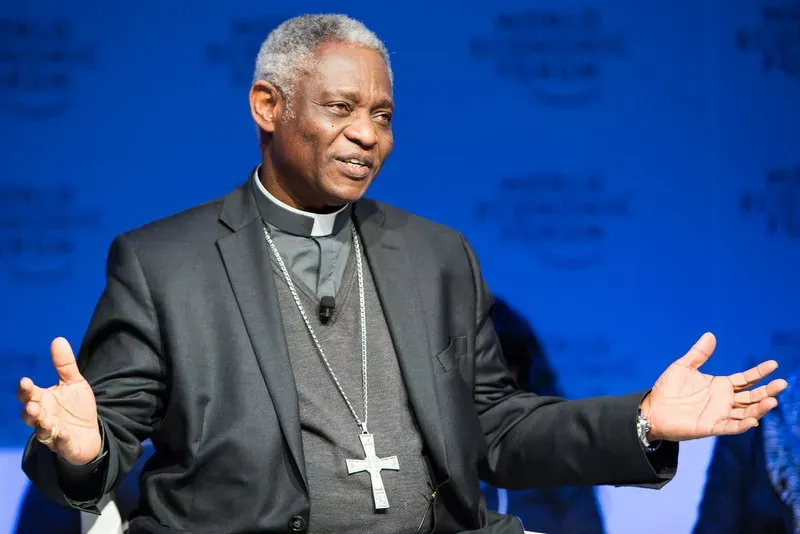
I knew one piece of information: it was four ballots. It's too quick for a longshot. Throw all the longshot lottery tickets straight into the garbage. You need someone with gravitas, who is capable of capatulting to 2/3rd in a relatively short time period. And those two were the ones I picked out. I bought thousands of shares of each of them as other traders were focused on Tagle/Parolin.
A few minutes later, my jaw dropped as Prevost -- the guy I had just amasssed shares in at 200-1 like 20 minutes earlier-- walked out onto the balcony as Pope.
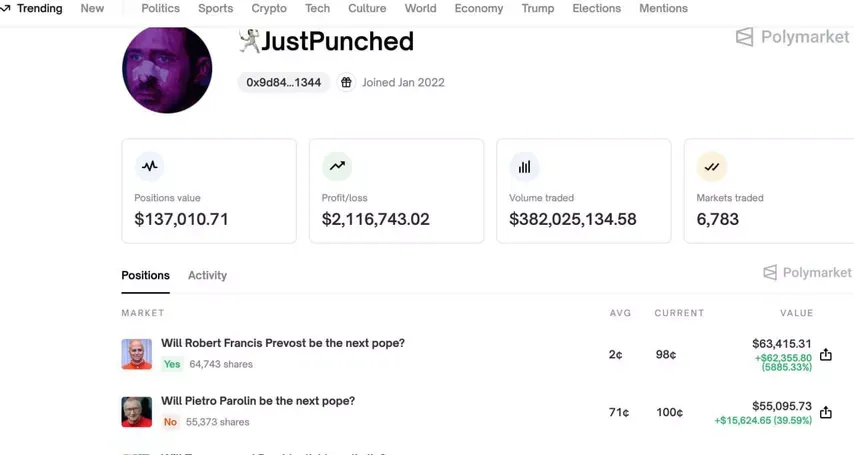

Almost every reply to Domer's post was full of praise and thanks for the straightforward explanation—except one. Martin Kabrhel, one of the most prolific professional poker players (and trolls) of the modern era, seemed confused about Domer's reason for posting.
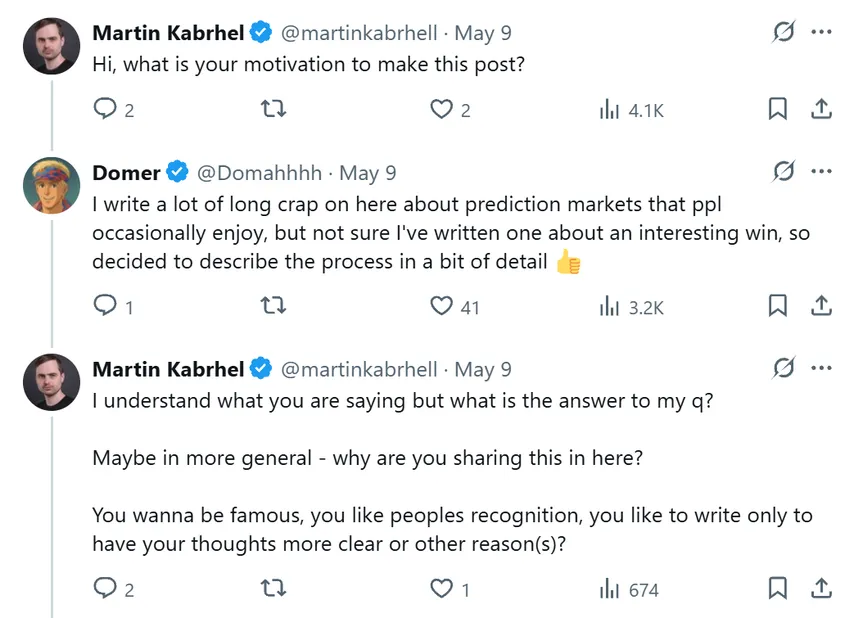
Domer: None of those reasons. I am a proponent of good prediction markets, and would like to have them popularized and accepted. I'm an evangelist. This is my career.
And now that prediction markets are getting more popular, I like to also write about stuff that goes wrong with them. But it's a little bit of a downer to be writing about negative stuff all the time, so I felt like writing a positive one. Because the job can be very fun and rewarding.
I guess what prompted this post in particular was people expressing how prediction markets "failed" on this. And alright, that's fair. But it was really the conventional wisdom that failed at anticipating the pope, first of all...and then secondly, it was market dynamics that elevated cardinals for not very good reasons to prices that weren't justified. I tried to at least give some color as to why the prices were where they were, and why I felt they were wrong.
Outsiders to prediction markets look to them for information, as they should. They are often, but not always, better than any other source for what is going to happen.
But traders look to them for profit opportunities, TRYING to find wrong markets. Which has the net effect of making them more accurate.
So if it wasn't for my involvement, the market would've been more inaccurate. Tagle would maybe be at 23 instead of 22. Parolin would maybe be at 31 instead of 30. Or whatever. So my contribution, for which I was paid money, was to make the market a tiny bit more accurate with researched information. Prediction markets reward you if you're right. You're paid to find inefficiencies. This post was illustrating that.
Kabrhel: How long did it take for you to write all of this (original post and this last response)?
Otherwise, all clear – gl to you.
Domer: Dang, I forgot to time it
I can install a camera inside of my house for you, Martin, if you're interested. That way you can have a live, 24/7 feed?
Kabrhel: Ok, that works.












